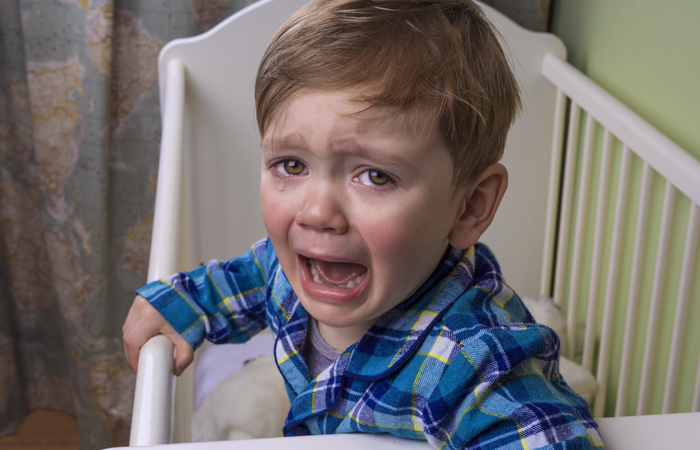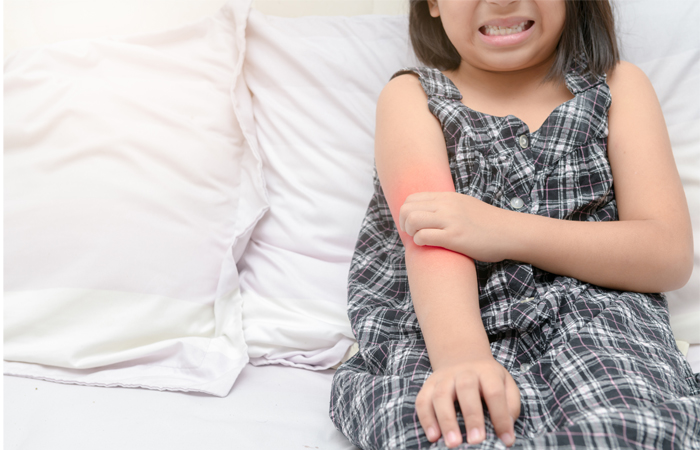In Conditions
Follow this topic
Bookmark
Record learning outcomes
Parents don’t just have their own health to worry about. A sick child can be a great source of stress, but pharmacy teams can help by answering some common questions with expert advice.
Caring for kids
Q: “My five-year-old son has started waking during the night and crying and isn’t able to get back to sleep by himself. He was previously a good sleeper. Any idea what might be causing this and how we can break the habit?”
A: “When we work with families we carry out a detailed assessment to establish what may be causing sleep issues and begin to identify strategies that may help,” says sleep expert Vicki Dawson from the Children’s Sleep Charity. “We explore every area of life including bedroom environment, diet, medical issues and the bedtime routine. One important piece of advice for all families is that it is important to have consistency to promote a good night’s sleep.”
It is important for children to fall asleep in their bed by themselves, without a parent being present, otherwise they can find it hard to go back to sleep if they wake up. When children wake up during the night, pharmacy teams should recommend that parents check that the child is not unwell, but not pick them up or get into bed with them, as it is important that children learn to get back to sleep by themselves.
Q: “There is a history of allergy in my husband’s family. I’m concerned our 10-month-old son may have a food allergy. What signs should I be looking for?”
A: “Having a parent with a food allergy does not necessarily mean the child will develop one. If you are worried and have noticed any symptoms, your GP or paediatrician will take a full clinical history and allergy history, and can then be referred to a dietician if food allergy is suspected for feeding history to be taken,” says registered dietitian Sarah Khweir at the British Dietetic Association (BDA).
According to Allergy UK, signs of a food allergy include:
- A flushed face, hives, red and itchy rash around mouth, tongue or eyes which can spread across body
- Mild swelling, especially of lips, eyes and face
- Runny or blocked nose, sneezing, watering eyes
- Nausea and vomiting, stomach cramps and diarrhoea
- Itchy mouth and throat.

Q: “My 18-month-old daughter has had several ear infections this winter, but our GP is reluctant to prescribe antibiotics. Why is this and what can I give her to help manage them?”
A: Doctors tend not to prescribe antibiotics for ear infections in children under two, because the infection usually clears in two to three days and antibiotics make little or no difference to the speed of recovery. In some cases, a GP may prescribe them for a severe infection; if an infection does not settle in two or three days; if any complications develop; or if a child has another medical condition, which may increase their risk of infection.
Pharmacy teams can recommend simple painkillers, such as children’s paracetamol or ibuprofen, to ease the pain and reduce a fever and plenty of fluids should be given to avoid dehydration.
Q: “I’m worried that my 10-year-old daughter may be becoming overweight. Should I start restricting what she eats? Who is the best person to take her to see for advice?”
A: Hannah Whittaker, registered dietitian at the BDA says that if parents are worried about their child becoming overweight, it is not advisable to restrict their food. Instead, they can be advised to keep a diary of their current food intake and look to make sensible swaps where possible, “such as replacing butter with lower fat spread, swapping crisps, chocolates and sweets for fruit and low fat yoghurt and also monitoring portion size”, she explains. As for additional expert advice, Hannah says a GP or school nurse can also offer “first-line advice and then referral onto the community health and wellbeing team or community dietetics may be required.” Currently, one in three children aged 10-11 are obese or overweight in the UK. Pharmacy teams can check whether a child is overweight by calculating their body mass index (BMI) using a child growth chart.
Q: “My five-year-old’s eczema worsens in winter. What can I do to protect his skin from flare-ups during cold weather?”
A: “Many factors, including cold weather and central heating, can exacerbate eczema during winter. Central heating reduces humidity, which dries out skin, so keep it at a comfortable 20°C. Using emollients regularly will restore the skin barrier and protect it from environmental factors, reducing risk of flare-ups,” says Dr Zainab Laftah, consultant dermatologist and British Skin Foundation (BSF) spokesperson.
Emollients come in several forms. Ointments are the heaviest and are good for overnight use. Creams are a mix of oils and water and can contain hydrating urea and glycerine. Lotions are lighter as they contain more water and can be good for milder eczema. Around 15-20 per cent of children have eczema, with 80 per cent developing it by the age of five.

Q: “I’d like to use the wet combing method to get rid of my children’s head lice, as I’m not keen on using chemicals. How do I do this properly and how often I should repeat it?”
A: “It’s important not to confuse detection combs for louse detection and removal with those for removing nits (eggs). A louse detection and removal comb should be made of plastic with a gap of 0.20-0.30mm between teeth. To remove eggs, a finer comb with a gap of 0.09-0.19mm between teeth is needed,” says Joanna Ibarra, programme co-ordinator at Community Hygiene Concern.
Pharmacy teams can also pass on these top tips:
- Wash hair with ordinary shampoo
- Apply plenty of conditioner
- Use a wide toothed comb to detangle hair
- Use the detection and removal comb
- Slot teeth of detection comb into hair at roots so it touches the scalp. Draw it through to the tips of the hair, maintaining contact with scalp for as long as possible
- Check comb for lice after every stroke and remove any by wiping or rinsing comb
- Work through hair section by section
- Rinse off conditioner
- Repeat the combing to check for any missed lice.
This should be repeated on days five, nine and 13 and then again on day 17 to ensure a child’s head is lice-free.
Something serious
Some conditions that affect children can be quite serious, so being aware of the symptoms and spotting these early can be crucial and may even be the difference between life and death
Customers should always be referred to a GP if a child’s condition worsens, their condition does not improve after two to three days or if they have a temperature of 39°C or above. Customers should always be referred to A&E if a child’s skin looks pale, mottled, ashen or bluish or if a child is lethargic, hard to wake, does not respond to social cues or has difficulty breathing.
Q: “My seven-year-old son has developed a rash and temperature and I’m worried it could be measles. He hasn’t had the measles, mumps and rubella (MMR) jab. What are the signs?”
A: A fever, conjunctivitis and a runny nose are the early signs. This is followed by small white spots inside the mouth one or two days later. A dry cough is also common. Other symptoms include poor appetite, tiredness and aches and pains, diarrhoea and vomiting. A blotchy red rash normally appears three to four days after the first symptoms, starting on head and neck and spreading to the body.
In the UK, measles is a notifiable disease so customers must see their GP if measles is suspected. If it is confirmed, those who have been in contact with the person with the disease will need to be tested. The MMR vaccination can be given at any age and parents should be encouraged to get their children vaccinated.
Q: “I’ve heard about sepsis and how dangerous it can be. What are the main warning signs to watch out for?”
A: Dr Ron Daniels, founder and executive director at the Sepsis Trust, says: “If you’re worried about your child, it’s always best to seek professional advice. If your child is unwell and seems to have an infection, the warning signs include: breathing very fast; having a fit or convulsion; skin is mottled, bluish or pale; there is a non-fading rash; child is lethargic and hard to wake; skin feels cold to touch. If you notice any of these, take your child to A&E.”
Signs of sepsis in under fives also include not feeding, vomiting repeatedly and not passing urine for 12 hours. Some 25,000 children are affected by sepsis annually, and one in four survivors suffer permanent, life-changing effects.
Q: “Does a rash always appear in meningitis? What earlier symptoms should I watch out for in my children?”
A: Children under five and teens are most at risk from meningococcal meningitis – the most common bacterial form. Many children developing meningitis will first have a fever, feel tired and sick. Later symptoms can include leg pains; cold hands and feet; and pale, dusky or blue-coloured skin around the lips. A rash does not always develop but if it does appear it is red or purple. Small spots develop at first and can be anywhere on the body. They tend to grow and look like small bruises. These blotches or spots do not fade when pressed. The rash is a sign of sepsis and needs urgent medical help. Anyone with possible meningitis signs needs to be admitted to hospital for urgent tests.
All about teens
Moving on from children to teens, there are some health concerns that can have an impact on both a teenagers’ physical and mental health.
Q: “My 16-year-old daughter has worsening acne which is starting to scar on her face. So far, she’s only tried acne creams that we've bought from the pharmacy, which don’t seem to help. What can you suggest?”
A: “While there is no cure for acne, available treatments are effective in preventing breakouts and scarring. In general, most take two to four months to take effect. Treatments include topical and oral antibiotics, retinoids and azelaic acid. Certain types of the oral contraceptive pill can help reduce the oil produced by the skin. Isotretinoin (roaccutane) is a powerful and effective drug if the above treatments have been ineffective,” advises Dr Laftah.
Acne is a common condition that affects many teenagers and can have significant psychological effects. Some teens may feel embarrassed to talk about it so pharmacy teams should make sure to use encouraging language and let customers known the skin condition is caused by hormonal changes and not due to being unclean.
Q: “My periods have started to become more painful each month and a dose of ibuprofen doesn't seem to be enough anymore. What else could I take to ease the pain?”
A: While most women experience some pain during periods, for one in 10 it is bad enough to affect their daily lives and this is common in teens. It is thought to be caused by a build up of prostaglandins in the womb lining.
Pharmacy teams can talk to customers, and refer them to a GP if necessary, to discuss increasing a dose of nonsteroidal anti-inflammatory drugs (NSAIDs) such as ibuprofen. It may help to take anti-inflammatories regularly – every four hours – from the day before a period is due and for the first two or three days. GPs may prescribe the combined oral contraceptive, if appropriate, which can ease the pain and also help with heavy bleeding if that is also an issue.
Q: “My 12-year-old daughter used to be happy and relaxed, but since starting secondary school this year her character has changed. She’s quiet and withdrawn, often cries before going to school and complains of tummy ache and headache in an attempt to stay at home. What’s the best way to help her?”
A: “Starting secondary school for any child is difficult and tummy aches or headaches are a common side effect of anxiety in young adults. Anxieties at school may cause symptoms such as problems sleeping, feelings of nausea, shaking, sweating and hyperventilating. Your child may be a victim of bullying, have an undiagnosed learning difficulty or other factors could be causing her anxiety. Expectations can be a root of the stress and anxiety, alongside peer pressure,” says Nicky Lidbetter, CEO at Anxiety UK.
Nicky suggests that parents talk to their child’s teacher to make them aware of their concerns. “Arrange for your daughter to have regular check ups with her teacher to ensure that issues are addressed and the triggers that are anxiety inducing are discussed and methods adapted to reduce anxieties,” she advises.
Q: “I’m 16 and have started getting really sweaty armpits and feet, which is so embarrassing. I’ve tried normal antiperspirants, but these don’t help. Any advice?”
A: It is normal to sweat during exercise or when someone gets too hot, but excessive sweating, or hyperhidrosis, occurs when the body produces sweat despite not needing to cool down. It can happen for no obvious reason, as a result of another condition or as a side effect of some medications. Sometimes it gets better with age, but there are ways in which people can manage the condition.
“Hyperhidrosis is a common disorder, often affecting the armpits, soles of feet and palms. Although there is no cure, many treatments are available and can reduce your symptoms. First-line treatment is with antiperspirants containing aluminium chloride, which should be applied at night to dry skin. If this doesn’t work, iontophoresis, which passes a small electric current through areas of skin immersed in water, can be effective,” says Dr Laftah.
Customers can also be advised to:
- Wear loose-fitting clothing to minimise signs of sweating
- Using armpit shields can protect clothing and minimise signs of sweating
- Wear socks that absorb moisture. These should be changed at least twice a day, if possible
- Wear leather shoes where possible and wear different shoes day to day
- Avoid tight-fitting clothes and man-made fabrics
- Avoid wearing enclosed shoes that might make the feet sweat more
- Avoid drinking alcohol or eating spicy food as these can make sweating worse.
Q: “My 15-year-old son takes hours to get to sleep at night and he’s always tired. What can I do to help?”
A: “This is incredibly common in teenagers. At this age their body clocks go through shifts, meaning they genuinely don’t feel tired until later in the evening. Our sleep practitioners are trained to help youngsters gradually move their body clocks by adjusting sleep time by a few minutes each night. We sometimes use light boxes to help them wake up each morning time as a set wake up time is very important, even at weekends,” says Vicki.
Teens should avoid looking at screens in the hour before bedtime, as these can suppress production of melatonin, therefore making it harder to fall asleep. “Stress can also impact on sleep, so doing school work in bed should be avoided,” adds Vicki.

